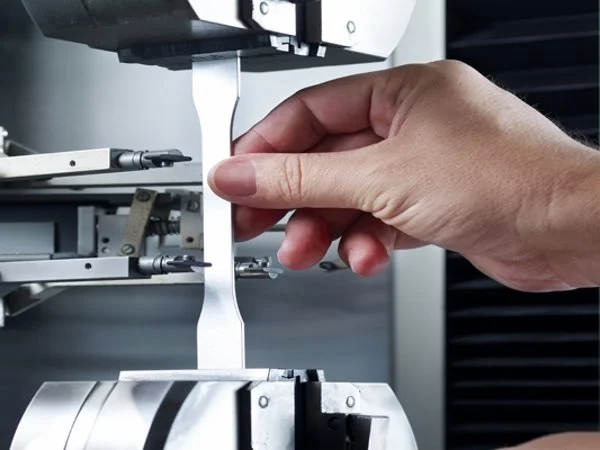GOST 7565 Bending Test of Steel Plates
The GOST 7565 bending test is a critical inspection method used to assess the mechanical properties and structural integrity of steel plates. This test is particularly relevant in the oil & gas sector, where high-strength materials are essential for ensuring safety and durability under harsh conditions.
The primary goal of this test is to evaluate how well a steel plate can withstand bending without failing. The procedure involves clamping one end of the specimen and applying a specified load until it bends beyond its elastic limit but not completely breaking or fracturing. This test provides insights into the ductility, toughness, and overall quality of the material.
For this test, the steel plates are typically cut to specific dimensions as outlined in GOST 7565. The specimens must be free from any defects that could compromise their structural integrity during testing. After preparation, they are placed on a bending machine where one end is fixed while the other is subjected to a progressively increasing load until it reaches a predetermined angle or point of failure.
The results of this test are crucial for quality assurance and compliance with international standards. It helps manufacturers ensure that their products meet stringent requirements, which is vital in industries like oil & gas where materials must perform reliably under extreme conditions.
Understanding the mechanics behind GOST 7565 involves knowing not only the physical process but also the underlying principles of material science. By analyzing how a steel plate behaves under stress during bending, engineers can identify potential weaknesses and improve future designs.
The test procedure itself is straightforward yet rigorous. Specimens are carefully prepared to meet the specified dimensions before being subjected to the bending force. The load applied must be accurately controlled to ensure consistent results across different samples. Once the testing is complete, detailed reports are generated that document all relevant parameters including maximum deflection angles achieved and any signs of material fatigue or cracking.
In addition to its role in ensuring product quality, the GOST 7565 bending test also serves as a valuable tool for research purposes. Engineers can use this information to better understand how various factors such as chemical composition, heat treatment processes, and manufacturing techniques affect the mechanical properties of steel plates.
It is important to note that while the basic principle remains consistent across different applications, variations may exist based on specific project requirements or local regulations. For example, in some cases, additional tests might be conducted alongside GOST 7565 bending test to provide more comprehensive evaluation of the material.
In conclusion, mastering the intricacies of GOST 7565 bending test is essential for anyone involved in manufacturing, quality control, or research within the oil & gas industry. Its ability to provide reliable data about the mechanical behavior of steel plates makes it an indispensable part of modern metallurgical practices.
Industry Applications
| Application Area | Description |
|---|---|
| Bridges and Offshore Platforms | Steel plates used in these structures must be able to withstand significant loads over long periods. The GOST 7565 bending test helps verify the structural integrity of such materials. |
| Pipelines | The bending properties of steel pipes are crucial for their installation in various environments, including harsh offshore conditions where they need to flex without breaking. |
| Offshore Drilling Rigs | Rig components must be robust enough to handle immense pressure and movement. This test ensures that the materials used are capable of withstanding these stresses. |
| Petrochemical Plants | Structural elements in petrochemical plants require durability against corrosive chemicals and extreme temperatures, making GOST 7565 bending tests a standard procedure. |
Why Choose This Test
- Comprehensive Evaluation of Mechanical Properties
- Ensures Compliance with International Standards
- Promotes Quality Assurance in Manufacturing Processes
- Aids in Research and Development Efforts
- Provides Reliable Data for Decision-Making
- Enhances Product Reliability and Safety
- Maintains Consistency Across Different Samples
- Supports Long-Term Structural Integrity of Materials
International Acceptance and Recognition
The GOST 7565 bending test is widely recognized and accepted in many countries, including Russia and other former Soviet republics. Its acceptance extends beyond these regions due to its relevance in ensuring the quality of steel plates used across various industries.
Standardization bodies around the world often reference or recommend GOST 7565 as a benchmark for evaluating the mechanical properties of steel plates. This recognition underscores its importance and reliability within the global metallurgical community.
Adhering to this test ensures that products meet not only domestic but also international standards, which is increasingly becoming necessary in today’s interconnected marketplaces. Companies operating internationally benefit from consistent quality metrics across different markets, reducing risks associated with non-compliance or substandard goods.





